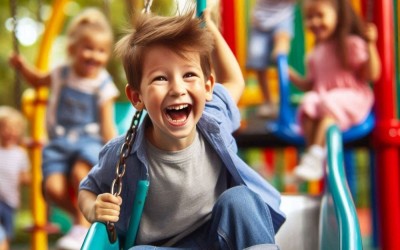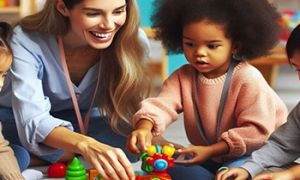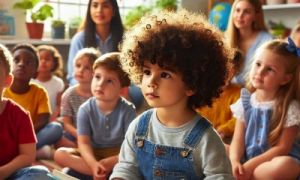Holistic approaches in early childhood include a spectrum of teaching goals and practices that facilitates all aspects – physical, emotional social as well as academic – of a child’s growth. The following article provides strategies for implementing a holistic approach.
Strategies For Implementing A Holistic Approach
Holistic approaches in early childhood education focus on nurturing the whole child, addressing their physical, emotional, social, cognitive, and spiritual development. Here are some key aspects and strategies for implementing a holistic approach:
1. Integrated Learning Experiences
- Play-Based Learning: Encourage learning through play, which supports cognitive, social, and emotional development. Activities like building blocks, role-playing, and outdoor exploration are great examples.
- Nature-Based Activities: Incorporate outdoor activities that connect children with nature, promoting physical health and emotional well-being.
2. Emotional and Social Development
- Emotional Intelligence: Teach children to recognize and express their emotions in healthy ways. Use tools like emotion cards, storytelling, and role-playing to help them understand and manage their feelings.
- Social Skills: Foster social interactions through group activities that encourage sharing, cooperation, and conflict resolution.
3. Physical Development
- Gross and Fine Motor Skills: Provide opportunities for physical activities that develop both gross motor skills (like running and jumping) and fine motor skills (like drawing and cutting).
- Sensory Play: Engage children in activities that stimulate their senses, such as sand play, water play, and sensory bins.
4. Cognitive Development
- Critical Thinking: Encourage problem-solving and critical thinking through puzzles, games, and open-ended questions.
- Language and Literacy: Promote language development through reading, storytelling, and conversations. Introduce new vocabulary and encourage children to express their thoughts2.
5. Spiritual and Moral Development
- Cultural Safety: Incorporate elements of Aboriginal cultural safety, such as traditional stories, songs, and dances. This helps children develop a sense of identity and respect for different cultures.
- Values and Ethics: Teach children about values like kindness, respect, and responsibility through stories, discussions, and role models.
6. Creating a Supportive Environment
- Safe and Nurturing Spaces: Design learning environments that are safe, welcoming, and conducive to exploration and learning.
- Individualized Attention: Pay attention to each child’s unique needs and interests, providing personalized support and encouragement.
Implementing these holistic strategies can help children develop in a balanced and comprehensive manner, preparing them for future challenges and opportunities. Would you like more specific activity ideas or resources on any of these aspects?
Activity Ideas That Align With A Holistic Approach
Integrated Learning Experiences
-
Nature Scavenger Hunt
- Objective: Enhance observation skills and connect with nature.
- Activity: Create a list of natural items for children to find (e.g., a leaf, a rock, a flower). Encourage them to explore and collect these items, discussing their findings.
-
Storytelling Circle
- Objective: Develop language and social skills.
- Activity: Gather children in a circle and take turns telling parts of a story. Use props or puppets to make it more engaging.
Emotional and Social Development
-
Emotion Charades
- Objective: Help children recognize and express emotions.
- Activity: Write different emotions on cards (happy, sad, angry, etc.). Children take turns picking a card and acting out the emotion while others guess.
-
Friendship Bracelets
- Objective: Foster social connections and fine motor skills.
- Activity: Provide beads and string for children to make bracelets for their friends. Encourage them to talk about what makes a good friend.
Physical Development
-
Obstacle Course
- Objective: Develop gross motor skills.
- Activity: Set up an obstacle course with items to jump over, crawl under, and balance on. Guide children through the course, encouraging them to try different movements.
-
Sensory Bins
- Objective: Stimulate sensory development.
- Activity: Fill bins with different materials (sand, rice, water beads) and include tools like scoops and cups. Let children explore the textures and practice pouring and scooping.
Cognitive Development
-
Puzzle Time
- Objective: Enhance problem-solving skills.
- Activity: Provide age-appropriate puzzles and encourage children to work together to complete them. Discuss strategies and celebrate their success.
-
Science Experiments
- Objective: Foster curiosity and critical thinking.
- Activity: Simple experiments like baking soda and vinegar reactions or growing seeds in a jar. Discuss the process and outcomes with the children.
Spiritual and Moral Development
-
Cultural Storytelling
- Objective: Promote cultural awareness and respect.
- Activity: Share traditional Aboriginal stories and discuss their meanings. Use visual aids like story stones or drawings to illustrate the tales.
-
Kindness Tree
- Objective: Teach values of kindness and empathy.
- Activity: Create a tree on a bulletin board and add leaves with acts of kindness written on them. Encourage children to add leaves whenever they do something kind.
Creating a Supportive Environment
-
Calm Down Corner
- Objective: Provide a safe space for emotional regulation.
- Activity: Set up a cozy corner with soft pillows, books, and calming tools like stress balls or sensory bottles. Teach children how to use this space when they need to calm down.
-
Personalized Learning Plans
- Objective: Address individual needs and interests.
- Activity: Observe each child’s interests and strengths, and create personalized activities that cater to their unique learning styles.
The defining principle of a holistic approach is the equal importance given to the emotional, social and physical growth of the child besides the academic. Traditional education used to prioritize intellectual development of the child like the learning of literacy and numeracy skills. However a holistic approach in early education setting uses teaching practices that aid all-round development of the child using:
- indoor materials, playground equipment and free outdoor play to foster the working of children’s limbs, gross and fine motor skills, sensory organs, hand-eye coordination etc
- paint, colours, music, fabric, loose parts, objects and elements from nature to nurture the child’s creativity and sense of wonder, curiosity and imagination
- group play, pair activities, buddy walk to develop social skills like collaboration, negotiation, planning and problem solving
- stories, songs, rhymes, art, and projects to teach emotional skills and self-regulation
- projects and activities to learn curricula concepts to lower emphasis on worksheets etc
Holistic approaches are organic and emergent. Use children’s discussions and interests to select the germ of an idea and then expand it into learning opportunities in several directions. For example, if a child expresses interest in airplanes, a teacher could, through projects or activities, facilitate discussions on how airplanes were invented, the flying machines in history, what types of airplanes are used for which purposes, the physics behind flying; understanding why some people can and cannot afford to fly; how airplanes impact environment and what might be some alternatives to long distance travel, new designs of airplanes and so on.
Engagement with the environment is another important feature of holistic approaches in early childhood. Plan to include more nature walks, school trips and free outdoor play so that young children are exposed to different elements, textures and sensory stimuli in nature. Let them work on projects like growing a kitchen garden or vermicomposting that will not only help them learn about soil, plant growth and seasons but also fosters a sense of responsibility to the environment and its long-term future. Also host Culture Days or invite public service professionals to speak at school so that children feel a sense of belonging to their cultural, social and civic environment as well.
Involving Parents In Promoting Holistic Development
Involving parents in promoting holistic development is essential, as it ensures that children receive consistent support both at home and in educational settings. Here are some strategies to engage parents effectively:
1. Regular Communication
-
Parent-Teacher Meetings: Schedule regular meetings to discuss the child’s progress, share observations, and set goals together.
-
Newsletters and Updates: Send out newsletters or emails with updates on classroom activities, upcoming events, and tips for supporting learning at home.
2. Workshops and Training
-
Parent Workshops: Organize workshops on topics like emotional intelligence, positive discipline, and the importance of play. Provide practical strategies that parents can use at home.
-
Cultural Awareness Sessions: Offer sessions that educate parents about incorporating cultural safety and respect for diversity in their parenting practices.
3. Home Activities
-
Activity Packs: Send home activity packs that include materials and instructions for nature-based activities, sensory play, or simple science experiments. Encourage parents to engage in these activities with their children.
-
Reading Programs: Create a reading program where parents and children read together. Provide a list of recommended books and discussion questions to enhance the experience.
4. Parent Involvement in Classroom
-
Volunteer Opportunities: Invite parents to volunteer in the classroom for special projects, field trips, or cultural celebrations. This helps them feel more connected to their child’s learning environment.
-
Guest Speakers: Encourage parents to share their skills, professions, or cultural traditions with the class. This enriches the learning experience and fosters a sense of community.
5. Support Networks
-
Parent Support Groups: Facilitate support groups where parents can share experiences, challenges, and strategies. This can be particularly helpful for discussing topics like building resilience and managing stress.
-
Resource Sharing: Provide parents with resources such as books, articles, and websites that offer guidance on holistic child development.
6. Feedback and Collaboration
-
Surveys and Feedback Forms: Regularly seek feedback from parents about their needs, concerns, and suggestions. Use this information to improve your programs and support.
-
Collaborative Goal Setting: Work with parents to set developmental goals for their children, ensuring that these goals are aligned with both home and school environments.
7. Celebrating Achievements
-
Showcase Events: Host events where children can showcase their work and achievements. This could include art exhibitions, performances, or science fairs. Invite parents to celebrate these milestones.
-
Recognition Programs: Implement programs that recognize and celebrate the efforts of both children and parents in supporting holistic development.
By actively involving parents and creating a partnership between home and school, you can provide a more comprehensive and supportive environment for children’s growth and development.
Further Reading
Practices Of The EYLF Version 2.0
Holistic Learning In Early Childhood
Scaffolding Children's Learning
Engaging Families In Early Childhood Education
Take Home Book Program For Preschoolers







 As an Educator in Australia, your pay rate falls under the Children’s Services Award 2010. This award states the minimum amount that an employer can
As an Educator in Australia, your pay rate falls under the Children’s Services Award 2010. This award states the minimum amount that an employer can When working as a qualified Early Childhood Teacher (with a university degree) within a service, your rate of pay will come from the Educational Services
When working as a qualified Early Childhood Teacher (with a university degree) within a service, your rate of pay will come from the Educational Services When working as a Diploma Qualified Educator your pay rate is from the Children's Services Award 2010. This Award states your minimum rate of pay
When working as a Diploma Qualified Educator your pay rate is from the Children's Services Award 2010. This Award states your minimum rate of pay When working as a Cert 3 Qualified Educator, your pay rate is from the Children's Services Award 2010. This Award states your minimum rate of
When working as a Cert 3 Qualified Educator, your pay rate is from the Children's Services Award 2010. This Award states your minimum rate of Educational Leaders play a crucial role in their early childhood service by ensuring that the educational program aligns with best practices and supports the holistic
Educational Leaders play a crucial role in their early childhood service by ensuring that the educational program aligns with best practices and supports the holistic In early childhood education and care, ratios are more than a technicality—they are a frontline safeguard. Every child deserves responsive supervision, emotional connection, and developmental
In early childhood education and care, ratios are more than a technicality—they are a frontline safeguard. Every child deserves responsive supervision, emotional connection, and developmental With the new national child safety reforms kicking in on 1 September 2025, early childhood services like yours have a real opportunity to lead the
With the new national child safety reforms kicking in on 1 September 2025, early childhood services like yours have a real opportunity to lead the Here’s a comprehensive Mobile Phone and Smart Watch Policy tailored for early childhood education and care (ECEC) services in Australia, aligned with the latest 2025
Here’s a comprehensive Mobile Phone and Smart Watch Policy tailored for early childhood education and care (ECEC) services in Australia, aligned with the latest 2025 The Sea of Fish Challenge is a national initiative that invites children, educators, families, and communities to create and display fish artworks as a symbol
The Sea of Fish Challenge is a national initiative that invites children, educators, families, and communities to create and display fish artworks as a symbol Across the early childhood education and care sector, educators are sounding the alarm: current staffing ratios are insufficient to deliver safe, meaningful, and developmentally appropriate
Across the early childhood education and care sector, educators are sounding the alarm: current staffing ratios are insufficient to deliver safe, meaningful, and developmentally appropriate


